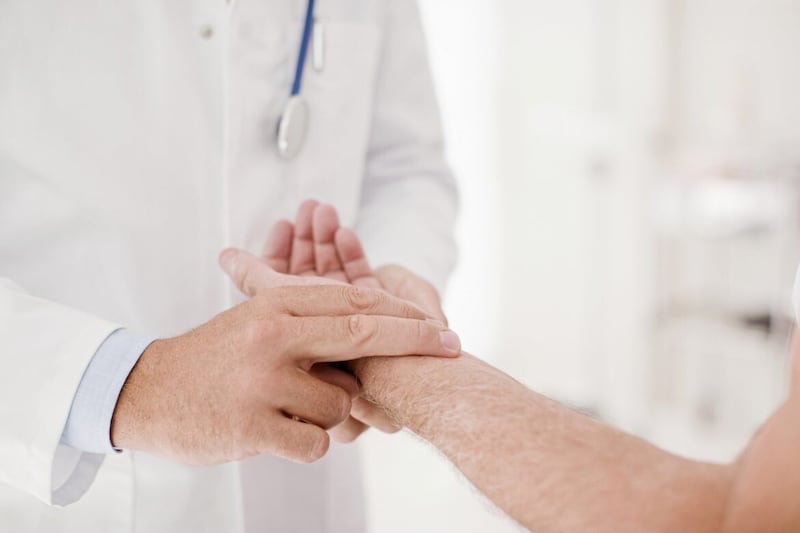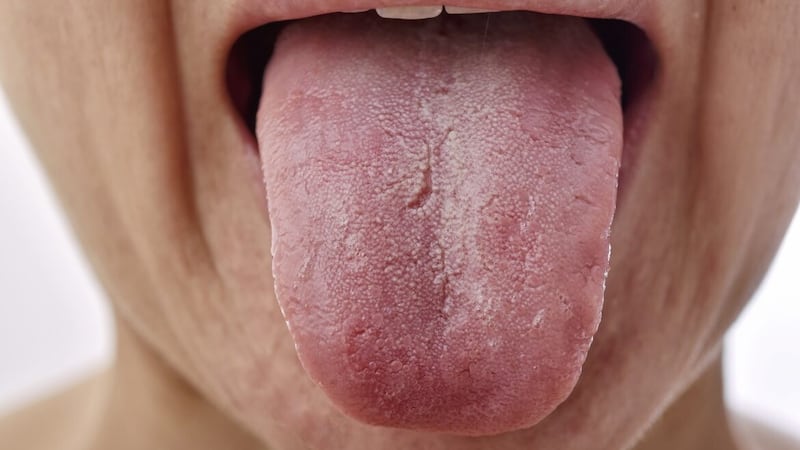Q: For several months I have had a burning sensation on my tongue and lower gums. It seems to get worse as the day goes on. The doctor called it burning mouth syndrome, but could not suggest any treatment to help. It really gets me down.
AS
A: I’ve come across this distressing and painful complaint on a number of occasions and the good news is that there are several treatments that have been proven to help — but first let me examine the likely cause.
The burning sensation may be persistent or, as in your case, build up through the day. Some people also experience a dry mouth or distorted sense of taste as well.
Despite often significant pain, oral examination will not reveal any obvious cause.
This is known as primary burning mouth; ‘secondary’ burning mouth is where there’s an underlying condition, such as acid reflux or allergies, causing the symptom.
You ask in your longer letter if Covid might be to blame. In fact, at least one study has shown that burning mouth has been linked to Covid; but it’s very rare, and tends to occur during or immediately after the infection.
Your symptoms may well clear: research shows that 30 to 50 per cent of patients with burning mouth find their symptoms resolve spontaneously, but this can take months, or even years.
However, there are drugs that have been found to help. These included anticonvulsants, such as clonazepam (which also has a tranquilising effect, so perhaps working on the perception of pain in the brain) and pregabalin or gabapentin (which act on nerve cell function and messaging).
Another option is a different type of drug such as pramipexole. Studies have found some people with burning mouth have low levels of the brain chemical dopamine (which plays a role in the regulation of pain), and pramipexole stimulates dopamine receptors in the brain.
In a study in 2017, with six patients (five of whom, like you, found their symptoms worsened as the day wore on), all experienced relief from their symptoms with pramipexole, according to the report in the journal Neurologia. The improvement continued throughout a four-year follow up.
I must point out each of these drugs comes with the risk of side-effects, which in the case of pramipexole include nausea, dizziness and difficulty sleeping — but you may decide the trade-off to resolve your pain may be worth it.
I suggest you ask your GP for a trial to assess which of these treatments might be most suitable.

Q: I gasp for breath after putting the shopping away — sometimes I collapse into a chair. I saw a doctor when this started 18 months ago and had an ECG and an echocardiogram. Both were fine. I am nearly 90 but don’t feel this is age-related. I walk a mile a day on a treadmill without gasping.
A: SD
A: Your symptoms sound alarming and a diagnosis is essential as they are neither to be expected nor accepted at the age of 90.
The episodes are all associated with a sudden physical exertion, when your muscles call for a greater flow of oxygenated blood.
Undoubtedly the cause lies with your heart and although you discount it in your longer letter, I think there is a strong possibility you have aortic stenosis, a type of heart valve disease that reduces blood flow between the lower left heart chamber (the left ventricle) and the main artery, or aorta.
Essentially the aortic valve, which controls the flow of blood out of the left ventricle, becomes stiff — it’s common at your age.
There may be no symptoms on modest exertion, but a sudden, more vigorous demand for blood flow may result in acute breathlessness (i.e. gasping).
However, I would have expected this to have been seen on your echocardiogram. Perhaps you could ask your GP specifically about the aortic valve and your echocardiogram results.
Aortic stenosis results in a unique pulse — so your GP could identify it. If this diagnosis is confirmed, rest assured the valve can be replaced, with a minimally invasive procedure, via the large artery at the top of your leg, known as a TAVI procedure. The results of this are excellent.

Q: During a visit to A&E with a cracked rib, I was told my heart rate was a little high. I have since been checking my pulse at rest and it is 80 beats per minute (bpm), which surprises me. I take a brisk 30-minute walk daily and a 30-minute hill walk weekly, with no discomfort. Do I need medication to reduce my pulse?
PJ
A: I believe there’s no need for concern about this. You say in your longer letter that you take doxazosin, prescribed for high blood pressure.
This is a drug called an alpha adrenoceptor antagonist. A known and harmless side-effect of these drugs is reflex tachycardia, where the heart beats faster.
There is no harm in having a slightly raised heart rate: you’re still within the normal range of 60bpm to 100bpm.
What matters is that your blood pressure is normal and you are symptom-free with no breathlessness when you exercise, indicating that your heart function is good.
Rest assured, you don’t need to be worried.
© Solo dmg media








